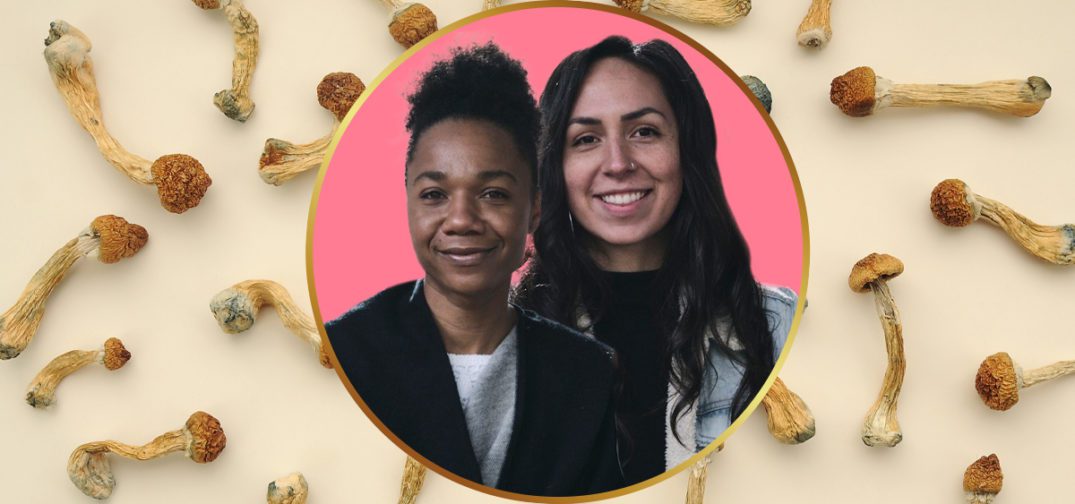When Colorado voted to legalize adult-use cannabis, they became a guiding light for the states that came online next. This is the position that Oregon state is in after passing Ballot Measure 109, which aims to legalize psilocybin services by 2023. Currently, the state is in a two-year waiting period where an established Health Equity Subcommittee will inform the Oregon Health Authority (OHA) “on requirements, specifications, and guidelines for providing psilocybin services in Oregon” alongside four other subcommittees. Oregon-based Fruiting Bodies Collective uplifts marginalized voices in psychedelics and reserves space in the movement to facilitate safe experiences for marginalized people. Founders Elan Hagens and Rebecca Martinez also serve as advocates on the Health Equity Subcommittee while engaging in education and community outreach with Fruiting Bodies.
“We see ourselves as advocates helping make sure that we have a program worth inviting people to participate in. If it’s not a just program, it doesn’t matter how much representation we have later—it’s going to be an uphill climb, much like a lot of the cannabis industry has been in recent years,” said Co-Founder Rebecca Martinez.
One evening after Measure 109 passed, Elan and Rebecca imagined an ideal future with legal psilocybin medicine. After that pivotal conversation, they chose to found Fruiting Bodies. As they imagined what the future could look like, the pair realized that one crucial role of their vision was building a framework that included the communities who have preserved the psychedelic space for generations. There are a few ways that the collective has activated to achieve this goal, and education is one pillar of the work.
The Fruiting Bodies podcast features diverse guests conversing on the psychedelic and healing spaces. They utilize the platform to amplify creatives and community leaders while examining these communities. Additionally, interest in the podcast demonstrated a need for more affordable, digestible education on psilocybin and psychedelics, so Fruiting Bodies released The Complete Guide to Oregon’s Psilocybin Therapy Program and the Complete Guide to Microdosing e-books, available through their website. Fruiting Bodies is also raising money to build an affordable, social justice-informed Psilocybin Facilitator Training & Certification program.
But when it comes to educating people, there are challenges in reaching marginalized communities to educate them on healing possibilities of unregulated drugs like psilocybin. “There’s a lot of risk being a person of color and associating yourself with any type of drug whether it be psychedelics or anything. When you go outside of drugs, even accessing yoga classes and pilates classes in a non-gentrified, stereotypical type of way is hard. So how do you get involved with those types of things? We’re in Oregon where only 4% of the community is Black. So how do you do that educating right now when it’s not yet legal?” said Co-Founder Elan Hagens.
Building policy that breaks down the hurdles of the drug war can help educators like Elan and Rebecca access communities who don’t yet feel the freedom to learn about unregulated drugs after decades of being unjustly targeted by the judicial system. In response to this challenge, another pillar of Fruiting Bodies is retaining space within the Oregon psilocybin therapy regulatory framework for marginalized communities. Ballot Measure 109, passed in 2020, will create a licensing framework for psilocybin services including manufacture, transport, delivery, sale, and use of psilocybin mushrooms at licensed sites in Oregon. The measure directs the OHA to build this system after a two-year development period ending December 2022. As advocates on the subcommittee which is dictating the framework, Elan and Rebecca want to “ensure there is space for grassroots groups like Fruiting Bodies who are devoted to the deep relationship that is medicine with psilocybin mushrooms,” and adorn that space as inviting and safe.
Creating a policy-driven structure around something “so juicy and fluid and alive and ever-changing” is complicated. So complicated that it’s easy for activism-driven advocacy to get lost in the dry space of governmental procedure. We asked both Fruiting Bodies founders how they stay focused on their goals while moving through the rigor of a subcommittee.
Elan credits her ability to set boundaries. She only accepts opportunities and positions where she knows she can do the most good. When she’s feeling creative, honoring that time and giving herself the space to put down distractions and focus solely on that work can replenish her spirit. These tactics help keep her spirit sustained to continue advocating with idealism in the subcommittee.
Rebecca focuses on the immovable goals of their advocacy while understanding that they will have to make concessions. Fruiting Bodies’ foundational goal will always be representation: “What motivates us is making sure there is representation in every corner of this emerging field. So, from the decision-makers to the stakeholders who want to produce, to the people who want to facilitate or have small businesses or be educators. A lot of the phase we’re in right now, because we have a year and a half until the Measure 109 program launches, is laying the groundwork. We’re tilling the soil so that it will be healthy and ready for the things that will want to grow there.”
Fruiting Bodies Collective is an example for psychedelic medicine advocates, just as Oregon is now the example for the legalization of psilocybin. As more cities, counties, and states contemplate legalizing, decriminalizing, or regulating ancient medicines, we must respect those who’ve been working with earth-based entheogens for generations.
As Elan put it, “No matter what we know, this work came from the underground movement, from indigenous people. The people who are the move-makers, the doctors, they don’t give any respect or want to hear from the underground even though that’s where they got their information.”
Through advocacy and education, Elan and Rebecca are working to inform inclusive regulations which respect those who came before. Fruiting Bodies will bring the underground and the “above board” together, building a fruitful future for psilocybin medicine. Learn more about Fruiting Bodies at fruitingbodiescollective.com.
End
